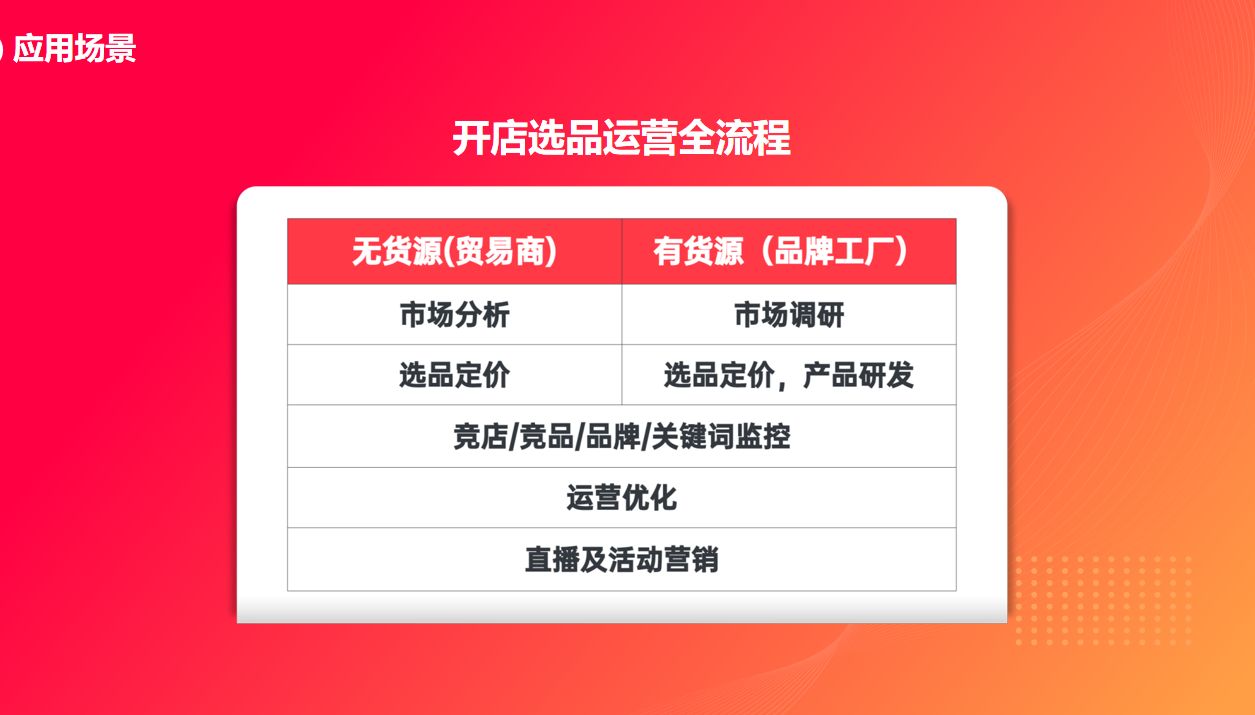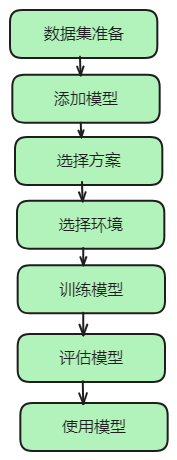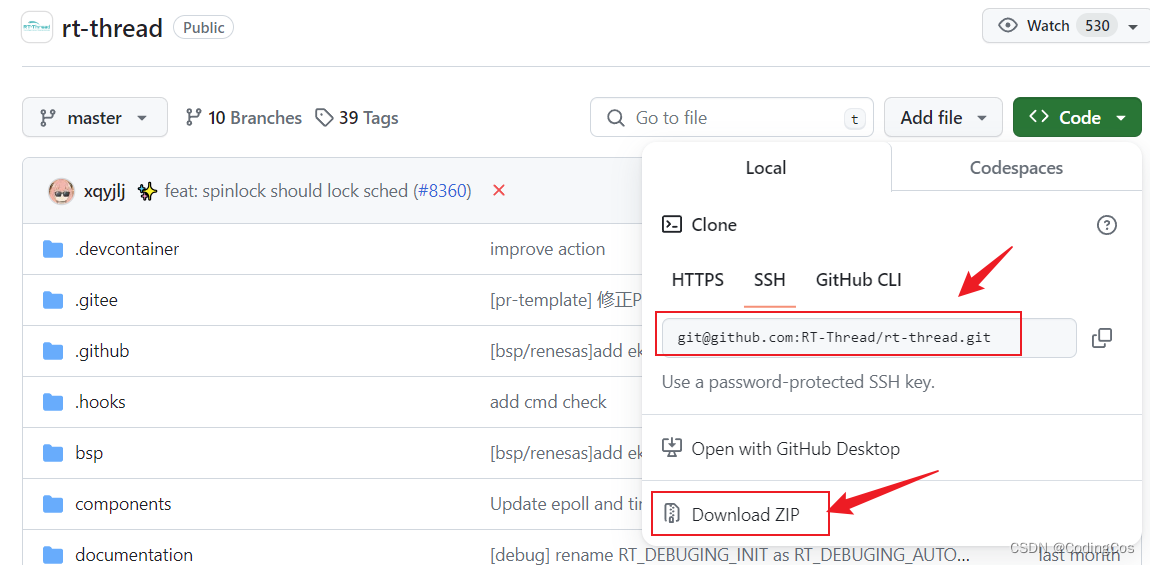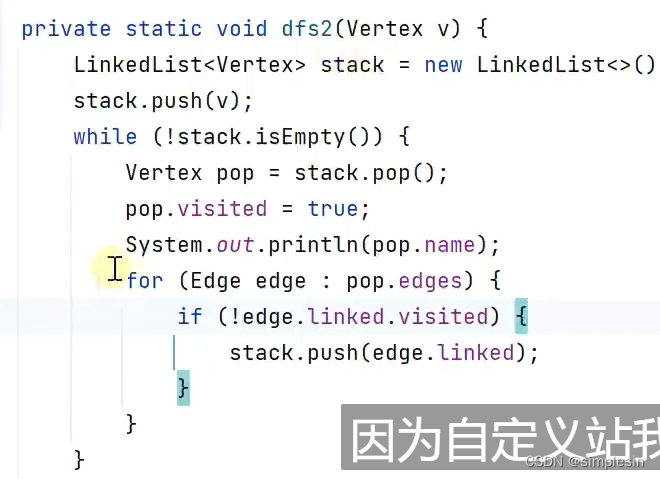一、串口设备查看
查看串口 (/dev)
ls /dev/tty*
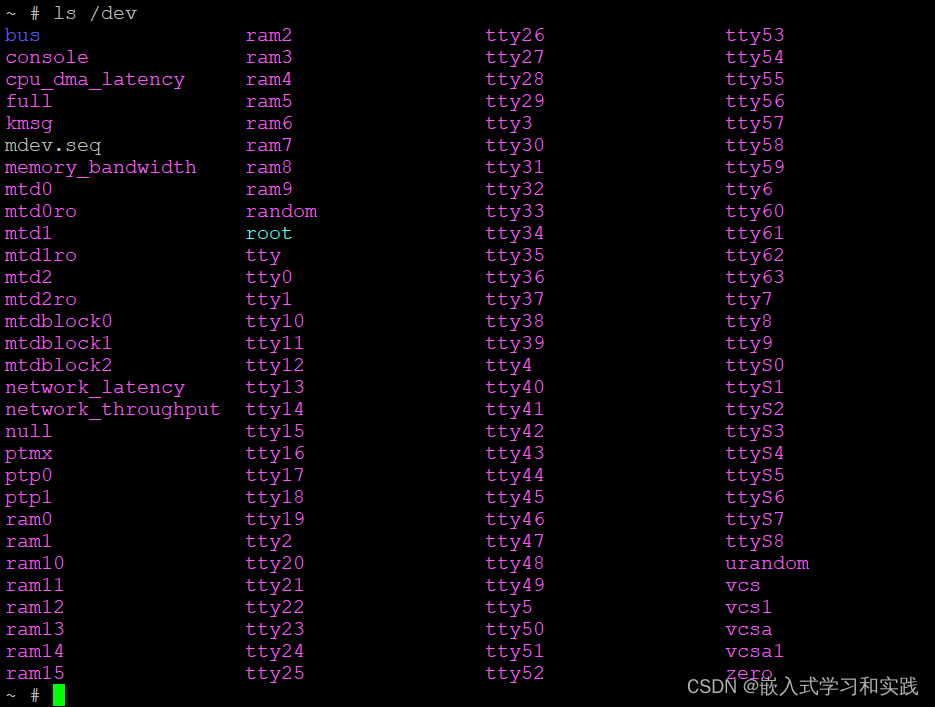

查看串口(或串口终端)属性 ( /proc)
cat /proc/tty/driver/serial 或
cat /proc/tty/drivers
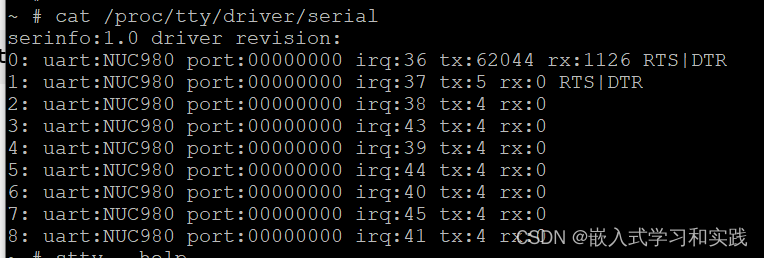

二、串口自测指令
测试打印口
echo haha > /dev/ttyS0


三、串口测试参考程序
连接方式:以nuc980开发板为例,将串口1和串口2的收、发线交叉连接。
nuc980官方uart测试程序
/***************************************************************************** ** Copyright (c) 2014 Nuvoton Technology Corp. All rights reserved. ** *****************************************************************************//***************************************************************************** * FILENAME* uart_test.c** VERSION* 1.0** DESCRIPTION* This is the test program used to test the UARTs on NUC980 EV board** DATA STRUCTURES* None** FUNCTIONS* None** HISTORY* ** REMARK* None****************************************************************************/
#include <stdio.h>
#include <stdlib.h>
#include <unistd.h>
#include <sys/types.h>
#include <sys/stat.h>
#include <fcntl.h>
#include <termios.h>
#include <errno.h>
#include <string.h>
#include <signal.h>
#include <pthread.h>#define FALSE 0
#define TRUE 1int fd[2];pthread_t threads[10];char buff[101];static struct termios newtios,oldtios; /*termianal settings */
static int saved_portfd=-1; /*serial port fd */static void reset_tty_atexit(void)
{if(saved_portfd != -1){tcsetattr(saved_portfd,TCSANOW,&oldtios);}
}/*cheanup signal handler */
static void reset_tty_handler(int signal)
{if(saved_portfd != -1){tcsetattr(saved_portfd,TCSANOW,&oldtios);}_exit(EXIT_FAILURE);
}static int open_port(const char *portname)
{struct sigaction sa;int portfd;printf("opening serial port:%s\n",portname);/*open serial port */if((portfd=open(portname,O_RDWR | O_NOCTTY)) < 0 ){printf("open serial port %s fail \n ",portname);return portfd;}/*get serial port parnms,save away */tcgetattr(portfd,&newtios);memcpy(&oldtios,&newtios,sizeof newtios);/* configure new values */cfmakeraw(&newtios); /*see man page */newtios.c_iflag |=IGNPAR; /*ignore parity on input */newtios.c_oflag &= ~(OPOST | ONLCR | OLCUC | OCRNL | ONOCR | ONLRET | OFILL); newtios.c_cflag = CS8 | CLOCAL | CREAD;newtios.c_cc[VMIN]=1; /* block until 1 char received */newtios.c_cc[VTIME]=0; /*no inter-character timer *//* 115200 bps */cfsetospeed(&newtios,B115200);cfsetispeed(&newtios,B115200);/* register cleanup stuff */atexit(reset_tty_atexit);memset(&sa,0,sizeof sa);sa.sa_handler = reset_tty_handler;sigaction(SIGHUP,&sa,NULL);sigaction(SIGINT,&sa,NULL);sigaction(SIGPIPE,&sa,NULL);sigaction(SIGTERM,&sa,NULL);/*apply modified termios */saved_portfd=portfd;tcflush(portfd,TCIFLUSH);tcsetattr(portfd,TCSADRAIN,&newtios);return portfd;
}void * process1(void* arg)
{int portfd = (int) arg;unsigned char i, j;int rev1, rev2;char RxBuffer[101]; rev1 =0;rev2 =0;while(rev2 < 100){rev1 = write(portfd,(buff+rev2),100);rev2 += rev1;}printf("\n uart1 send %d byts\n", rev2);rev1 = 0;rev2 = 0;while(rev2 < 100){rev1 = read(portfd,(RxBuffer+rev2),100);rev2 += rev1;}printf("\n uart1 receive %d bytes\n", rev2);for(i = 0; i < 100; i++){if(i != RxBuffer[i]){printf("\n uart1 compare Error!!");while(1);}}printf("\n uart1 compare correct!!\n");printf("\n uart1 test done!!\n");} void * process2(void* arg)
{int portfd = (int) arg;unsigned char i, j;int rev1, rev2;char RxBuffer[101];rev1 =0;rev2 =0;while(rev2 < 100){rev1 = write(portfd,(buff+rev2),100);rev2 += rev1;}printf("\n uart2 send %d bytes \n", rev2);rev1 = 0;rev2 = 0;while(rev2 < 100){rev1 = read(portfd,(RxBuffer+rev2),100);rev2 += rev1;}printf("\n uart2 receive %d bytes \n", rev2);for(i = 0; i < 100; i++){if(i != RxBuffer[i]){printf("\n uart2 compare Error!!");while(1);}}printf("\n uart2 compare correct!!\n");printf("\n uart2 test done!!\n");}/**
*@breif main()
*/
int main(int argc, char **argv)
{char *dev[10]={"/dev/ttyS1", "/dev/ttyS2"};unsigned int i;printf("\n demo uart1/uart2 external loop back function \n");for(i = 0; i < 100; i++){buff[i] = (i & 0xff);}for(i = 0; i < 2; i++){if((fd[i] = open_port(dev[i]))<0)return -1;}pthread_create(&threads[0], NULL, process1, (void*)(fd[0]));pthread_create(&threads[1], NULL, process2, (void*)(fd[1]));pthread_join(threads[0], NULL);pthread_join(threads[1], NULL);return 0;
}Makefile文件
.SUFFIXES : .x .o .c .sCC := arm-linux-gcc
STRIP := arm-linux-stripTARGET = uart_demo
SRCS := uart.c
LIBS = -lpthread -lc -lgccall:$(CC) -static $(SRCS) -o $(TARGET) $(LIBS)$(STRIP) $(TARGET)clean:rm -f *.orm -f *.xrm -f *.flatrm -f *.maprm -f temprm -f *.imgrm -f $(TARGET)rm -f *.gdb
测试结果
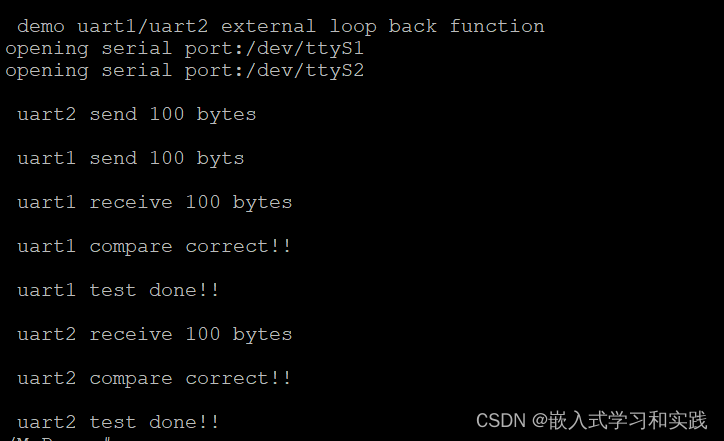
nuc980官方rs485测试程序
/** Copyright (c) 2014 Nuvoton technology corporation* All rights reserved.** This program is free software; you can redistribute it and/or modify* it under the terms of the GNU General Public License as published by* the Free Software Foundation; either version 2 of the License, or* (at your option) any later version.**/#include <stdio.h>
#include <stdlib.h>
#include <unistd.h>
#include <sys/types.h>
#include <sys/stat.h>
#include <fcntl.h>
#include <termios.h>
#include <errno.h>
#include <string.h>
#include <signal.h>
#include <pthread.h>
#include <linux/serial.h>#define FALSE 0
#define TRUE 1/* Driver-specific ioctls: ...\linux-3.10.x\include\uapi\asm-generic\ioctls.h */
#define TIOCGRS485 0x542E
#define TIOCSRS485 0x542Fint fd[2];pthread_t threads[10];char buff[256];static struct termios newtios,oldtios; /*termianal settings */
static int saved_portfd=-1; /*serial port fd *//* Test GCC version, this structure is consistent in GCC 4.8, thus no need to overwrite */
#if (__GNUC__ == 4 && __GNUC_MINOR__ == 3)struct my_serial_rs485
{unsigned long flags; /* RS485 feature flags */#define SER_RS485_ENABLED (1 << 0) /* If enabled */#define SER_RS485_RTS_ON_SEND (1 << 1) /* Logical level for RTS pin when sending */#define SER_RS485_RTS_AFTER_SEND (1 << 2) /* Logical level for RTS pin after sent*/#define SER_RS485_RX_DURING_TX (1 << 4)unsigned long delay_rts_before_send; /* Delay before send (milliseconds) */unsigned long delay_rts_after_send; /* Delay after send (milliseconds) */unsigned long padding[5]; /* Memory is cheap, new structs are a royal PITA .. */
};#endifstatic void reset_tty_atexit(void)
{if(saved_portfd != -1){tcsetattr(saved_portfd,TCSANOW,&oldtios);}
}/*cheanup signal handler */
static void reset_tty_handler(int signal)
{if(saved_portfd != -1){tcsetattr(saved_portfd,TCSANOW,&oldtios);}_exit(EXIT_FAILURE);
}static int open_port(const char *portname)
{struct sigaction sa;int portfd;
#if (__GNUC__ == 4 && __GNUC_MINOR__ == 3)struct my_serial_rs485 rs485conf;struct my_serial_rs485 rs485conf_bak;
#elsestruct serial_rs485 rs485conf;struct serial_rs485 rs485conf_bak;
#endif //printf("opening serial port:%s\n",portname);/*open serial port */if((portfd=open(portname,O_RDWR | O_NOCTTY, 0)) < 0 ){printf("open serial port %s fail \n ",portname);return portfd;}printf("opening serial port:%s\n",portname);/*get serial port parnms,save away */tcgetattr(portfd,&newtios);memcpy(&oldtios,&newtios,sizeof newtios);/* configure new values */cfmakeraw(&newtios); /*see man page */newtios.c_iflag |=IGNPAR; /*ignore parity on input */newtios.c_oflag &= ~(OPOST | ONLCR | OLCUC | OCRNL | ONOCR | ONLRET | OFILL); newtios.c_cflag = CS8 | CLOCAL | CREAD;newtios.c_cc[VMIN]=1; /* block until 1 char received */newtios.c_cc[VTIME]=0; /*no inter-character timer *//* 115200 bps */cfsetospeed(&newtios,B9600);cfsetispeed(&newtios,B9600);/* register cleanup stuff */atexit(reset_tty_atexit);memset(&sa,0,sizeof sa);sa.sa_handler = reset_tty_handler;sigaction(SIGHUP,&sa,NULL);sigaction(SIGINT,&sa,NULL);sigaction(SIGPIPE,&sa,NULL);sigaction(SIGTERM,&sa,NULL);/*apply modified termios */saved_portfd=portfd;tcflush(portfd,TCIFLUSH);tcsetattr(portfd,TCSADRAIN,&newtios);if (ioctl (portfd, TIOCGRS485, &rs485conf) < 0) {/* Error handling.*/ printf("ioctl TIOCGRS485 error.\n");}/* Enable RS485 mode: */rs485conf.flags |= SER_RS485_ENABLED;/* Set logical level for RTS pin equal to 1 when sending: */rs485conf.flags |= SER_RS485_RTS_ON_SEND;//rs485conf.flags |= SER_RS485_RTS_AFTER_SEND;/* set logical level for RTS pin equal to 0 after sending: */ rs485conf.flags &= ~(SER_RS485_RTS_AFTER_SEND);//rs485conf.flags &= ~(SER_RS485_RTS_ON_SEND);/* Set rts delay after send, if needed: */rs485conf.delay_rts_after_send = 0x80;if (ioctl (portfd, TIOCSRS485, &rs485conf) < 0){/* Error handling.*/ printf("ioctl TIOCSRS485 error.\n");}if (ioctl (portfd, TIOCGRS485, &rs485conf_bak) < 0){/* Error handling.*/ printf("ioctl TIOCGRS485 error.\n");}else{printf("rs485conf_bak.flags 0x%x.\n", rs485conf_bak.flags);printf("rs485conf_bak.delay_rts_before_send 0x%x.\n", rs485conf_bak.delay_rts_before_send);printf("rs485conf_bak.delay_rts_after_send 0x%x.\n", rs485conf_bak.delay_rts_after_send);}return portfd;
}void * process1(void* arg)
{int portfd = (int) arg;unsigned int i, j;int rev1, rev2;char RxBuffer[sizeof(buff)]; rev1 =0;rev2 =0;while(rev2 < sizeof(buff)){rev1 = write(portfd,(buff+rev2),sizeof(buff));rev2 += rev1;}printf("\n uart1 send %d byts\n", rev2);} void * process2(void* arg)
{int portfd = (int) arg;unsigned int i, j;int rev1, rev2;char RxBuffer[sizeof(buff)];rev1 = 0;rev2 = 0;while(rev2 < sizeof(RxBuffer)){rev1 = read(portfd,(RxBuffer+rev2),sizeof(RxBuffer) - rev2);rev2 += rev1;if(rev1 > 0)printf("\n uart2 receive %d bytes \n", rev2);}printf("\n uart2 receive %d bytes \n", rev2);for(i = 0; i < sizeof(RxBuffer); i++){if(i != RxBuffer[i]){printf("\n uart2 compare Error!!");while(1);}}printf("\n uart2 compare correct!!\n");printf("\n uart2 test done!!\n");}/**
*@breif main()
*/
int main(int argc, char **argv)
{char *dev[10]={"/dev/ttyS1", "/dev/ttyS2"};unsigned int i;printf("\n demo uart1/uart2 external loop back function \n");for(i = 0; i < sizeof(buff); i++){buff[i] = (i & 0xff);}for(i = 0; i < 2; i++){if((fd[i] = open_port(dev[i]))<0)return -1;}pthread_create(&threads[0], NULL, process1, (void*)(fd[0]));pthread_create(&threads[1], NULL, process2, (void*)(fd[1]));pthread_join(threads[0], NULL);pthread_join(threads[1], NULL);return 0;
}
Makefile文件
.SUFFIXES : .x .o .c .sCC := arm-linux-gcc
STRIP := arm-linux-stripTARGET = uart_rs485
SRCS := uart.c
LIBS = -lpthread -lc -lgccall:$(CC) -static $(SRCS) -o $(TARGET) $(LIBS)$(STRIP) $(TARGET)clean:rm -f *.orm -f *.xrm -f *.flatrm -f *.maprm -f temprm -f *.imgrm -f $(TARGET)rm -f *.gdb